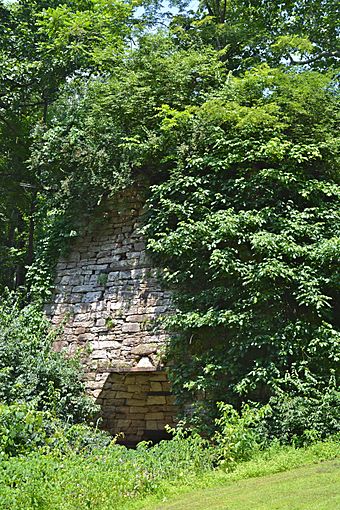Franklin Furnace Historic District facts for kids
Quick facts for kids |
|
|
Franklin Furnace Historic District
|
|
 |
|
| Location | Roughly bounded by Circle Drive and Cinder Street, near Edenville, St. Thomas Township, Pennsylvania |
|---|---|
| Area | 4 acres (1.6 ha) |
| Built | 1828 |
| Architectural style | Iron furnace |
| MPS | Iron and Steel Resources of Pennsylvania MPS |
| NRHP reference No. | 91001136 |
| Added to NRHP | September 6, 1991 |
The Franklin Furnace Historic District is a special place in St. Thomas Township, Franklin County, Pennsylvania. It is a national historic district, which means it's an important area with old buildings and structures that tell a story about the past. This district shows us what a 19th-century iron furnace "plantation" was like.
Contents
What is Franklin Furnace?
A historic district is a group of buildings, structures, or sites that are important because of their history, architecture, or culture. The Franklin Furnace Historic District helps us understand how iron was made long ago.
The Iron Furnace
The main part of this district is an old iron furnace. In the 1800s, iron furnaces were like big factories. They used heat to melt iron ore and turn it into useful metal. This process was very important for making tools, machines, and many other things people needed. The furnace here was a "bloomery," which was a type of furnace used to make iron directly from ore.
Buildings and Structures
The Franklin Furnace Historic District includes several parts that worked together. These are called "contributing" elements because they add to the historical importance of the district.
The Furnace Stack
The most important structure is the furnace stack itself, built in 1828. It's a tall, strong stone tower where the iron ore was melted. It stands about 30 feet tall and is 30 feet wide at its base. This stack is a key reminder of the hard work done here.
Homes for Workers
The district also has four houses where the workers who operated the furnace lived. These homes show us how the people who worked at the furnace lived their daily lives.
The Manager's House
There is also a larger house that served as both the manager's home and the office for the furnace operations. This was where the business side of the iron production was handled.
Barn Ruins
You can also find the ruins of an old barn. Even though it's just ruins, it's an important part of the historic site. It reminds us that this was a busy place, likely with animals and storage needed for the furnace's operation.
History of the Furnace
The Franklin Furnace started working in 1828. It was a busy place for many years, making iron that was important for the economy of the area. However, by 1882, the furnace stopped its full operations. This often happened as new technologies for making iron came along, or as the local resources ran out.
In 1991, the Franklin Furnace Historic District was officially recognized and added to the National Register of Historic Places. This is a list of places across the United States that are important to American history. Being on this list helps protect the site and makes sure its story can be told for future generations.
 | Valerie Thomas |
 | Frederick McKinley Jones |
 | George Edward Alcorn Jr. |
 | Thomas Mensah |



